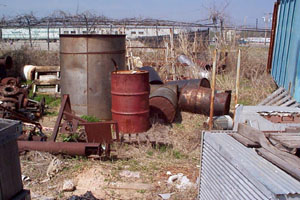
| Resources for Local Businesses |
WHAT YOU NEED TO KNOW:
The original 1991 Phase I stormwater regulations covered 11 categories of “industrial activities” which were listed by their Standard Industrial Classification (SIC) code number. The EPA and Oklahoma general permits organized these categories into 29 “sectors”, hence the permit reference is to a “multi-sector general permit”.
The Oklahoma Department of Environmental Quality (DEQ) has authority over industrial stormwater permitting. The DEQ has adopted a Multi-Sector General Permit for Industrial Activities (OKR05) that should be consulted about your permit coverage. DEQ’s OKR05 permit website includes document templates, forms and instructions for applying for coverage.
Specific types of industrial activities were selected for permit coverage because they have the greatest potential to contribute pollutants in stormwater runoff. Some of these activities apply to cities, for example operation of a sewage treatment plant. If you are not on the 1991 list of industrial activities, you still have responsibility under Federal, State and local authority to not cause releases of pollutants. WHAT YOU CAN DO AS A BUSINESS OWNER: |
 |
Restaurants
• Connect all drains to the city sewer; never discharge wastes to stormdrains or creeks.
• Regularly clean all grease traps, and operate with no leaks or overflows.
• Dispose of all waste materials in proper receptacles.
• Recycle used cooking oil and grease at rendering companies.
• Keep all dumpster lids closed and the areas around them clean.
Automotive Services
• Never mix chemicals together in a common container.
• Store materials in a rain-proof area; keep chemicals in a spill containment device.
• Recycle batteries, used motor oil, filters, anti-freeze, and other shop fluids.
• Use dry absorbents and drip pans to capture leaking auto fluids.
• Wash vehicles at a designated wash rack connected to the sanitary sewer.
Commercial Landscape Services
• Do not sweep or hose yard waste and chemicals into driveways or the street.
• Use natural, non-toxic alternatives to traditional garden chemicals.
• Dispose of unused lawn chemicals at an authorized chemical waste facility.
• Set sprinkler timing to conserve water and to only operate in dry periods.
• Use native plants to reduce water and chemical use and enhance survivability.
Carpet Cleaning Services
• Discharge wastewater into a sanitary sewer or to your truck for proper disposal.
• Never discharge wastewater into a street, parking lot or stormdrain.
• Filter wastewater before discharging to the sanitary sewer.
• Dispose of trash and non-hazardous filtered materials in the garbage.
Commercial Power Washing
• Dry-sweep the area with absorbents to remove liquids, trash, dirt and debris.
• Never discharge power washing runoff into a storm drain or ditch.
• Degreasers and solvents should be used sparingly.
• Confine spray runoff, then use wet/dry vacuums to collect wash water.
• Pump wash water into a sanitary sewer or service truck for offsite disposal.
General Considerations for all Businesses
• All drains used for washing vehicles or disposal must connect to the sewer system.
• Never pour chemicals into parking lots, streets, stormdrains or ditches.
• Use less-toxic alternatives to dangerous chemicals, such as biodegradable detergents.
• Dry-brush dirt and contaminants off of equipment; don’t wash off with water.
• Add porous surfaces, biofilters and vegetated swales around property to absorb runoff.
• Store chemicals in a covered area away from rainfall, and recycle unused materials.
• Keep dumpster lids closed when not in use, and keep waste disposal areas clean.
